Visiting Cheung Chau Island by ferry! Hong Kong cute character stores, FoFo Spanish restaurant, Bindaas Indian.

Believe it or not… the above photo was taken in Hong Kong!
The city is known for its tall skyscrapers and hectic atmosphere. However, you can escape into nature — simply by taking the ferry to several nearby islands, including Cheung Chau and Lamma Island.
(My top is by Disturbia. More fashion by this Gothic brand below.)

I’ll also show you some of the newest restaurants and kawaii pop culture in Hong Kong, such as this Sailor Moon makeup collection at SaSa.
One of Hong Kong’s icons is the Star Ferry, this open-air boat that runs from Tsim Sha Tsui (on the Kowloon side) to Central Pier. From there, you can hop onto ferries that take you to the outer-lying islands.

The most popular islands are the beach-y Discovery Bay, and Cheung Chau (home to the annual bun festival, where brave or foolhardy participants climb up a giant tower made of Chinese buns). It takes about 40-60 minutes for the ferry to reach these islands.
As you sail, you’ll get to take in spectacular views of Hong Kong’ skyscrapers. However, be prepared for choppy waters that can rock you off your feet.

I recommend visiting the lesser-known Lamma Island, which has a relaxed hippie vibe. Lamma is home to a cat museum (or Mewseum), small seafood restaurants, and plenty of secluded natural spots for swimming and hiking.

I also went to the larger Cheung Chau island for the first time. This is a popular day-trip destination for both locals and tourists, as it lets them escape the “Hong Kong hustle” for a fishing village atmosphere.

When you step onto the boardwalk, you’ll see rows of little shops selling island specialties: dried squid, fish balls on a stick, and the famous stamped buns.
At this grocer, we spotted a cat in a Superman costume. “It’s a bird… it’s a plane… It’s Super-Maoo!”
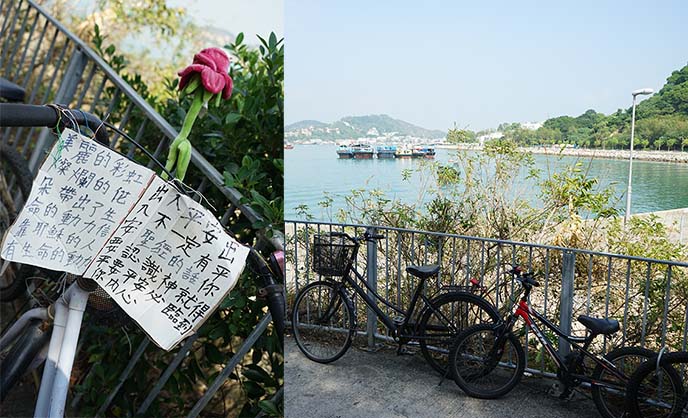
It’s possible to walk around Cheung Chau — but the winding paths around the island are made for cycling. There are plenty of stores that rent out bicycles and canopy-covered tricycles.
It’s a must do. I had so much fun zipping around and taking in the ocean views. With a bike, it’s easy to stop by landmarks such as the Cheung Po Tsai pirate cave.

I enjoyed my island getaways, as a way to slow down and relax in nature. However, there’s no place like Hong Kong to get your cute shopping on!

Causeway Bay remains the best neighborhood of Sanrio goods, and all things kawaii. (Here’s my comprehensive guide to shopping in Causeway Bay.)

Is there anything as cute as a basket of squishy-faced kittens? Whenever I’m in the Causeway Bay district, I stop by this cute cat store (more info and photos here.)

It’s the best concept ever. All of the cats inside this store… have flat faces!

There’s always a Scottish Fold and Exotic Shorthair in there. You can say hi to them, and pick up cat toys or food.

As you’ll recall from my Causeway Bay travel guide, this area is known for its Japanese malls.
Laforet always has changing themed displays. When I went, it was covered with pictures of Sanrio’s Little Twin Stars.

The pastel shades of the 1980s are back in style. Kiki and Lala haven’t aged a day.
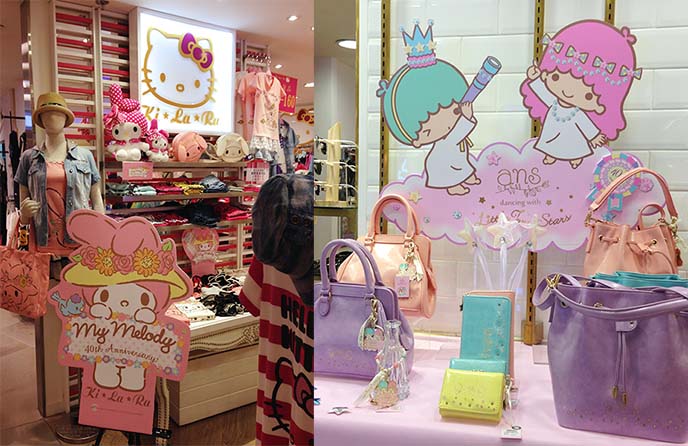
In Hong Kong, Sanrio characters are everywhere — and they’re not only for kids. You’ll find high quality purses, wallets, shoes and clothes with subtle designs featuring the characaters. ANS and KiLaRa are two Asian brands that often collaborate with Sanrio.

Kawaii is sometimes a bit twisted, in Hong Kong. Everywhere you go, there are cute-meets-weird signs and public displays.

You know I’m addicted to Miffy the bunny… Arome Bakery has dozens of location around the city, and this season, they carried Miffy moon cakes that came in tin boxes.
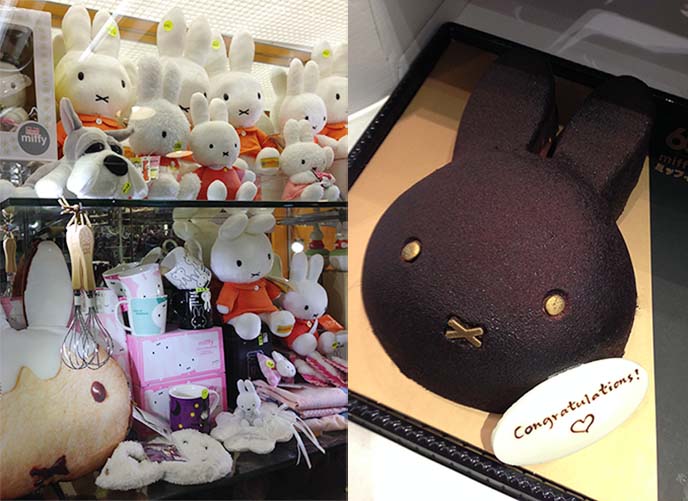
Arome has a new dark chocolate truffle Miffy cake with gold eyes and an X mouth. It’s scrumptious: layers of moist pudding and cake, spongy and not too sugary.

Isn’t it funny how Miffy, a character from the Netherlands, has taken over Hong Kong? In Japan and Korea, you won’t find nearly as many Miffy toys and products — and there are no such cakes.

One of my favorite stores is Homeless, the interior design shop with locations in Central and Sha Tin. They sell lots of Miffy goods — I picked up “Nijntje” keychains (that is her Dutch name).

In the Hung Hom mall next to Harbour Plaza Metropolis hotel, I stumbled upon a holiday display.
Since this is Miffy’s 60th anniversary, the bunny with the X-mouth is everywhere. (She currently has Miffy cafe and big displays at Hysan Place and other Causeway Bay locations.)

Every time I’m in Hong Kong, I stop by the Miffy TwoPercent fashion boutiques. I usually go to the Miffy shop in Causeway Bay’s WTC, but saw these backpacks in The One TST. (I’ll do a full report about this mall soon.)

Japanese kawaii designs are found in every part of Hong Kong — and usually for much lower prices. I couldn’t resist getting the fat mouse from the MiniSo store. Each toy is about $4 US.

Minions is currently the rage in Hong Kong, and I saw their smiling faces on lattes.
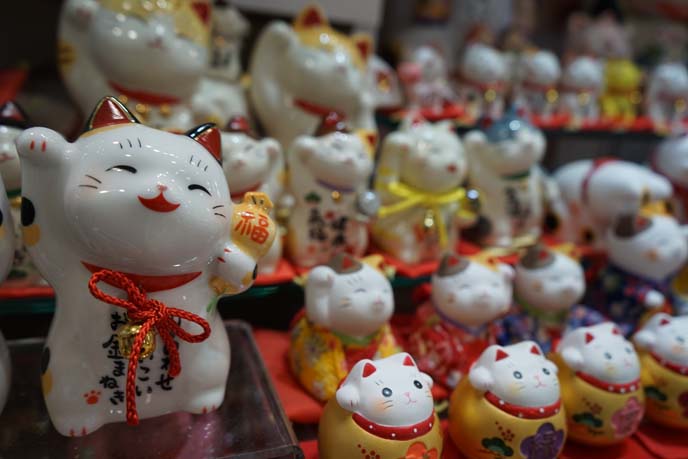
Cats remain popular as ever. You can find maneki nekos (fortune cats) everywhere for sale. These ones have both paws raised, for extra luck!

Another reason to love Hong Kong: the international dining. I had a magnificent dinner at the award-winning Spanish restaurant, FoFo by el Willy (address: 2-8 Wellington St). The smiling chef, Alex Fargas, skillfully designed the menu with influences from his native Barcelona and travels abroad.
I felt at home in the minimal space, decorated with rows of white penguins on the shelves and chandeliers. The server introduced me to a cute, round bull statue and explained that he is the mascot — since the word “fofo” means plump!

From the 20th floor window, we had a fantastic view of Central’s bright lights. Our server walked us up to the laid back rooftop, where people lounged and enjoyed cocktails. (I loved the rose sangria, with fresh cut strawberries and apples.)
The chef is a master at traditional Spanish dishes, which he delivers with a contemporary execution. We ate up every bite of the “bikini” sandwiches made with the finest cheese and Iberian ham, and juicy paella with seafood (above).

El Willy gets especially inventive with its tapas, or bite-sized shareable plates. I popped a “Salmon Explosive Air Bag” in my mouth, and the pastry burst into a delight of truffle sour cream and smoked salmon. Also home runs: paella crackers with sea urchin, and scallop ceviche with avocado and crispy shallots.

The desserts hit the spot with a freshly baked apple tart, churros with dark chocolate dipping sauce, and a creative “mojito” made with mint, jelly and sorbet.
With a laid back atmosphere and exceptional cuisine, FoFo is now on my short-list of favorite restaurants in Hong Kong.

My friends and I also went to the newly-opened Bindaas Bar + Kitchen, an Indian restaurant near the PMQ art center. (Address: LG/F, 33 Aberdeen Street, Central, HK).
The chefs recently came here from India, and brought their expertise to each dish. Nothing is heavy-handed: the ingredients are fresh, and the spices are a delight to the palate.

At the same time, Bindaas is not afraid to get creative, and excels at fusion. Their naan pizza is a must eat: it comes with several varieties of toppings, and brilliantly merges two comfort foods into one.
Bindaas also serves wonderful original cocktails with Indian flavors, such as yogurt lassi. (Photos from this restaurant by Sniper Chau)
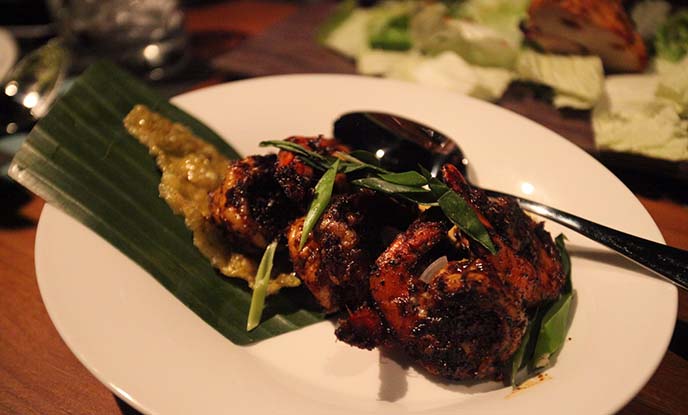
The seafood curries and tandoori dishes are stand-outs, and the small plates are great for sharing with a group of friends.
Bindaas is brilliant at Indian fusion, and is a welcome entry to the Hong Kong food scene.

Do these food and cute cat photos make you want to visit Hong Kong? In the next post, I’ll announce my April destinations, so stay tuned…
SHARE & COMMENT
El Dorado Maroma: Karisma’s Riviera Maya luxury beach resort. Le Lotus Rouge bar, Playa del Carmen.

Goths on the beach. Even in bright sunlight, Yukiro and I maintain our vampire attitude!
Karisma Hotels invited us to spend a day at El Dorado Maroma, their boutique oceanfront resort. It turned out to be our favorite property. We loved relaxing on this private beach so much that we delayed our leave by several hours!
(My pentacle top is this exact one by Rat Baby, a dark / alt clothing brand.)

Located in the Riviera Maya, El Dorado Maroma is for adults only, and cultivates a laid-back feeling. The grounds are filled with tall palm trees, giving the impression that you’ve stumbled upon a beach paradise.

I couldn’t wait to swim in the warm ocean. I wore a pentagram swimsuit by Pretty Attitude (here’s where you can get a Goth swimsuit with occult symbols printed on it).
My oversize reflective sunglasses are Linda Farrow x 3.1 Philip Lim. The designer has a cute cat-eared sunglasses version too.
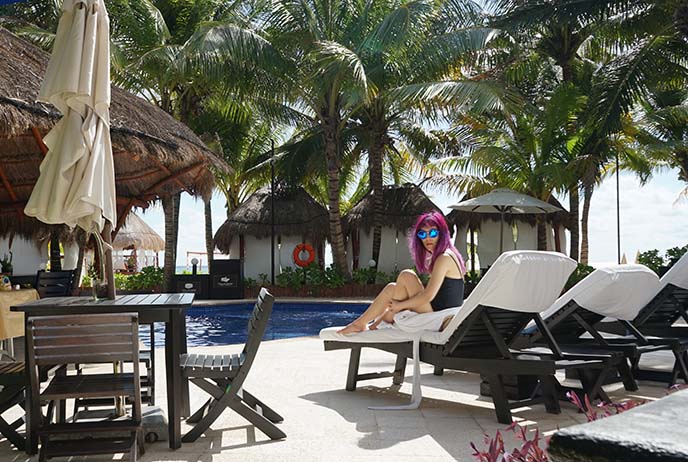
Yukiro and I had our own mega-suite, with sliding doors that opened into our private terrace, and a quiet swimming pool.
Shop for Gothic swimwear and dresses below:
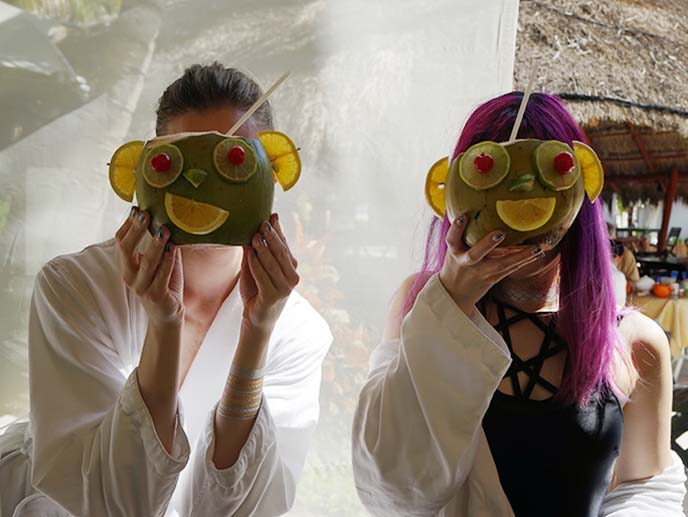
Things got a little crazy when the staff delivered two “Coco Locos” — a tropical cocktail of coconut, banana, rum and magic.
To top it off, they decorated the coconut shell like a monkey’s face!

I’ve never had a better welcome drink than this one. At Karisma El Dorado resorts, all food and drink are inclusive — so you can order a dozen Coco Locos if you pleased.

Strike a pose, vogue.
El Dorado Maroma is the only property with thatch-roofed overwater bungalows (similar to the 5-star huts found in the Maldives and Bora Bora).

We had our very own palapa beach bed, so we didn’t have to worry about other guests taking our prime spot by the ocean.
A staff member came around and offered sunscreen and margaritas. Yes to both.
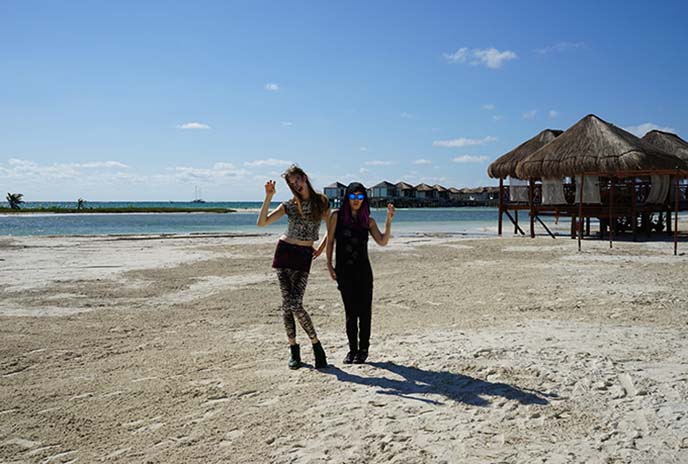
We got to preview El Dorado Maroma’s new overwater bungalows — perfect for a romantic honeymoon.

As you can see, the sand and waters were pristine. I was a happy girl, wading in the ocean.
(Closeup on the criss-cross straps of my Gothic swimsuit. Shop more styles with a click):
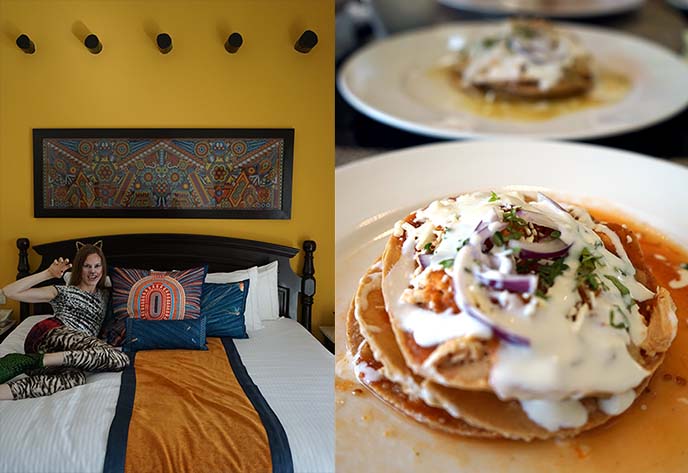
Meal time! Karisma Hotels are known as “gourmet inclusives” because they put great care into their restaurants.
We hit it off with our cheerful server, who insisted that we try his grandmother’s special coffee (dark, with a brush of cinnamon). He then brought us green and red chilaquiles, a layered tortilla dish known as a hangover cure.
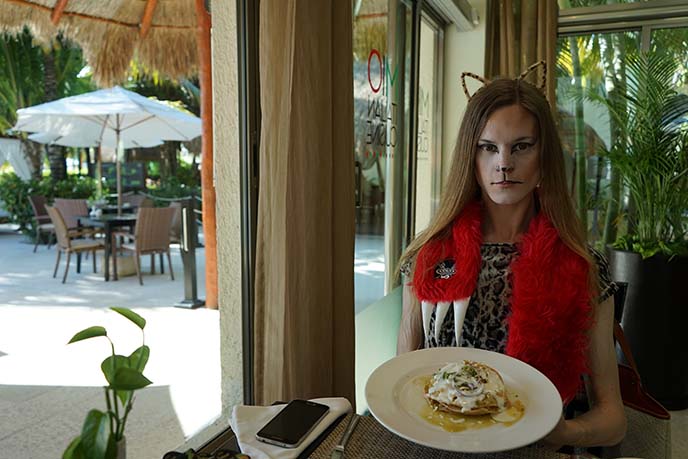
This kitty-cat was pleased with the authentic Mexican dish. It was one of our favorite meals of the entire trip.
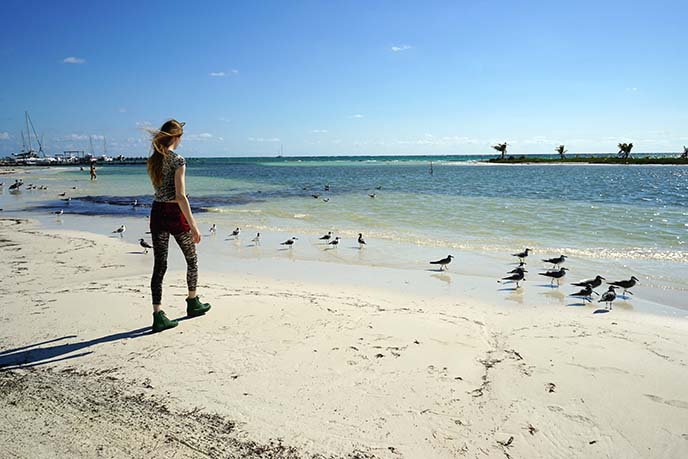
After, we walked down the long private beach. There’s nothing like listening to the sounds of the ocean, and looking out at the horizon…
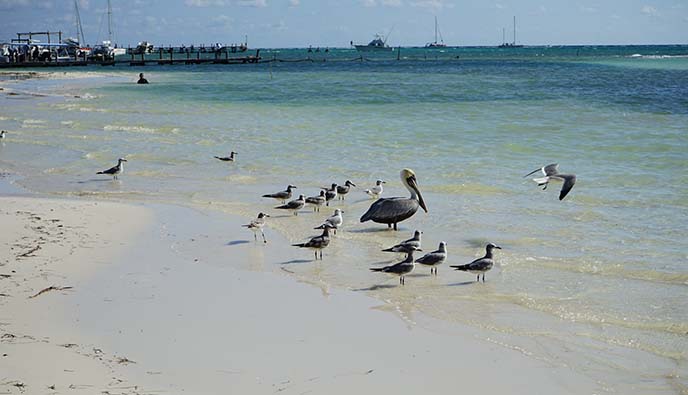
… and making friends with pelicans.
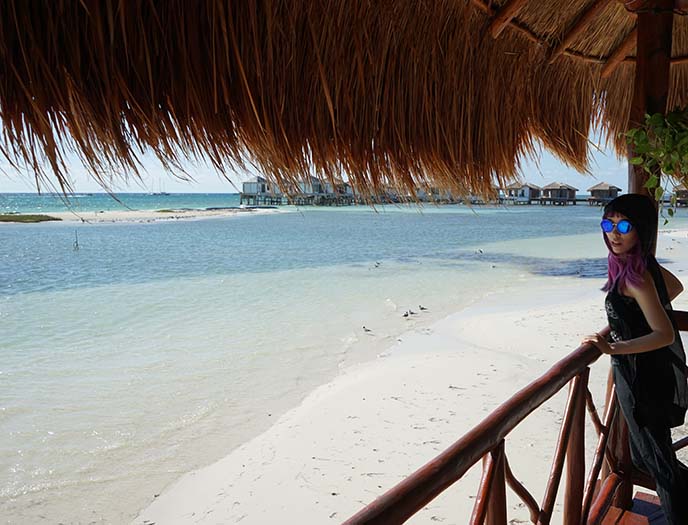
El Dorado Maroma is a quiet and exclusive space. Perfect for those who want a true beach getaway.
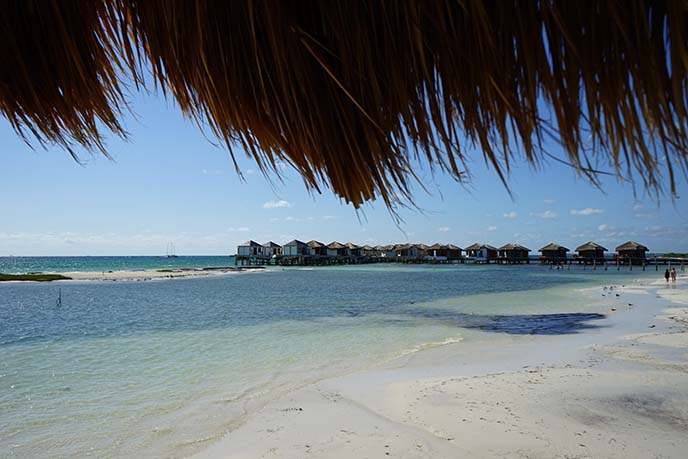
The resort will soon be home to 58 new “palafitos”, or over the water suites. If you’re dreaming of visiting Tulum, it’s good timing for a stay at El Dorado Maroma, a beachfront resort, by Karisma.

Later that evening, we went out with our new friend Paulina of LocoGringo tours. (Remember she took us to visit the famous Mayan pyramids?)
Paulina said we would love Le Lotus Rouge bar — and once again, she was spot on. (Address: 35th Avenue & Calle 2, Playa del Carmen, Mexico)

The Red Lotus is run by a French lady, who decorated the rooms to reflect her love of the arts. From the moment we stepped in, we felt at home in this eccentric, fabulous and slightly creepy space.

Le Lotus Rouge is infamous for its karaoke nights. Anyone can choose a song from the computer, and belt it out on microphones.
I have to say… Yukiro and I tore down the house, with our rendition of the 1980s Styx hit, Mr Roboto!

Glowing with lanterns and secret spaces, the Red Lotus one magical spot.
Playa del Carmen and Cancun tend have touristy nightlife — which is why we were pleasantly surprised to find this artistic bar, frequented by locals. The cocktails and food are also wonderful here.
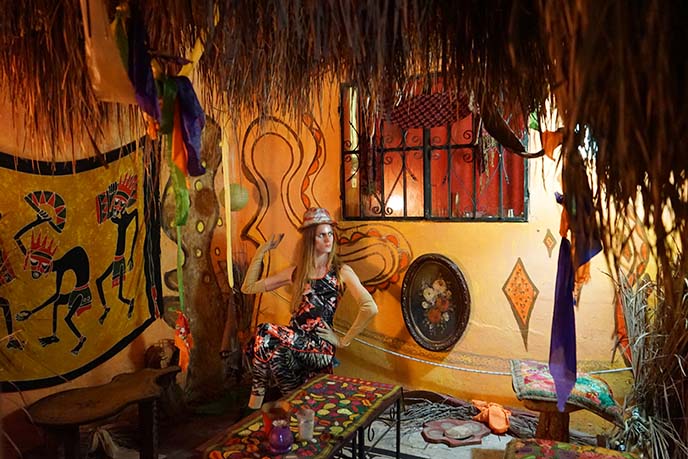
There are multiple theme rooms, each decorated with whimsy. This one has a tribal theme.

Disco dreams come true, when Yukiro is around.
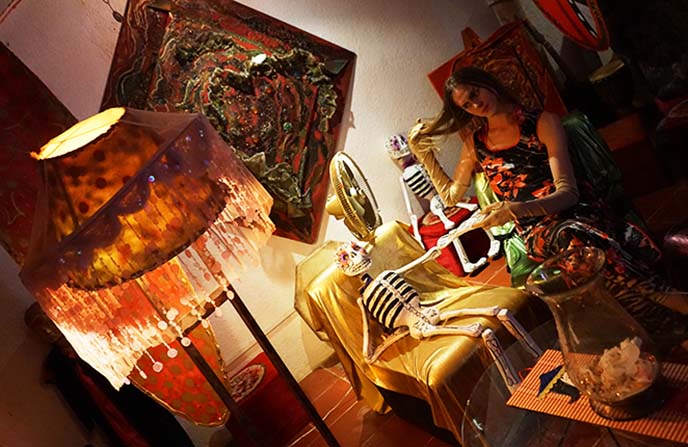
Boudoir furniture and skeletons are found all throughout Le Lotus Rouge.

I hope these photos show you an unexpected side of Playa del Carmen, which is typically associated with tourists and spring breakers.
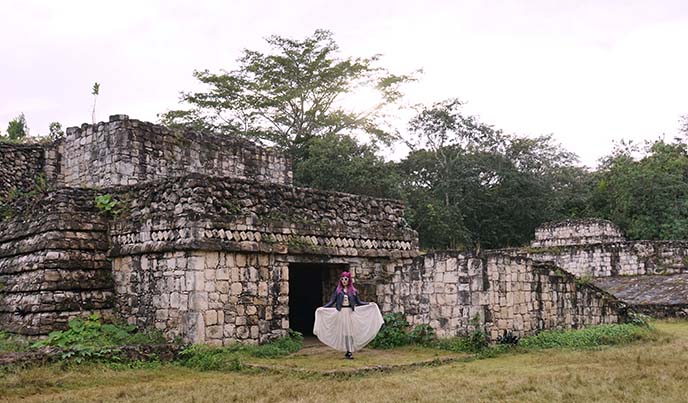
Gracias to Loco Gringo for the insider tour of Tulum. More photos to come, including a visit to a cemetery and Day of the Dead art gallery.
Until then, you can check out all my Mexico travel guides here. Have you been to Riviera Maya before?

 LA CARMINA
LA CARMINA






